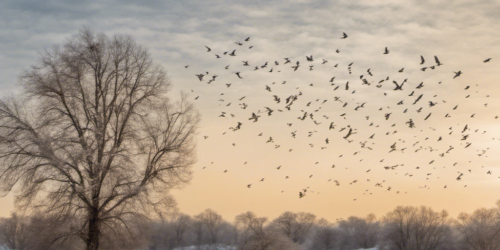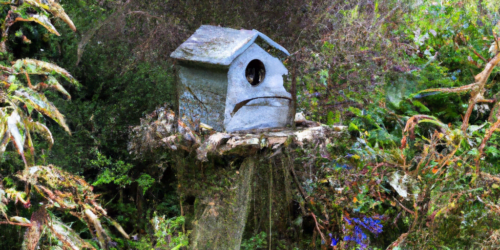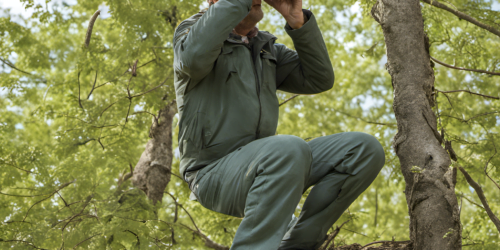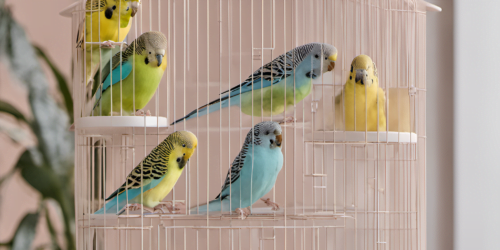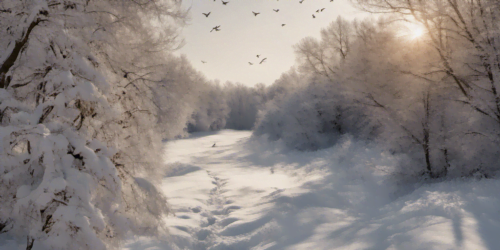Where Do Birds Go During Hurricanes?
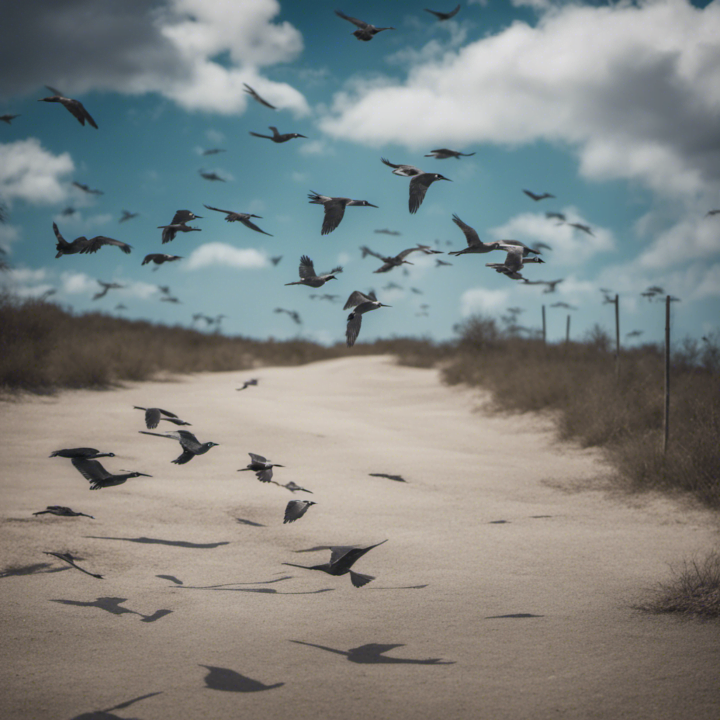
Introduction
Table Of Contents
Where do birds go during hurricanes you may ask? Hurricanes are powerful and destructive natural phenomena that can have a profound impact on wildlife.
While our primary concern lies with human safety, it is equally important to understand how other creatures, specifically birds, navigate these tumultuous storms.
So, where do birds go during hurricanes? Let’s unravel the secrets hidden within their behaviors and explore the fascinating information gathered from reputable sources.
The Audubon Society sheds light on bird behavior during hurricanes .
So where do birds go during hurricanes?
These resilient creatures do not all react in the same manner; some possess remarkable navigational abilities that allow them to sense changes in atmospheric pressure well before humans even notice them.
Shorebirds, for example, often detect an approaching hurricane through low air pressure and increased humidity. As a result, they adjust their flight patterns or migrate away from coastal areas earlier than usual.
Forbes contributes valuable insights into where do birds go during hurricanes by highlighting migratory bird populations’ advanced strategies for avoiding inclement weather conditions like hurricanes.
Driven by instinct honed over countless generations of evolution, some species embark on long flights across vast distances to avoid impending danger.
Surprisingly enough, certain small passerines known as “vagrant” or “storm-driven” migrants capitalize on strong winds associated with tropical cyclones.
Rather than radically altering course or seeking shelter when confronted with an approaching hurricane, these daring adventurers seize [the opportunity]to be transported thousands of miles off course —a fortunate circumstance that provides ornithologists with exceptional research opportunities into where do birds go during hurricanes
Sarasota Magazine explores how birds manage to survive amidst hurricane conditions. Flight capabilities play a crucial role: many bird species possess extraordinary skills enabling them to navigate high winds and turbulent air currents skillfully.
Seeking shelter is another vital factor—birds frequently take refuge in dense vegetation such as trees or shrubs offering protection against wind gusts and flying debris. Additionally, larger avian species like herons and egrets can withstand strong winds by perching on sturdy structures like buildings or bridges.
Allow me to present an intriguing case study from Hakai Magazine regarding brown pelicans in South Carolina during Hurricane Hugo. These majestic seabirds faced extreme weather conditions but not only survived; they demonstrated creative ways of coping with the storm’s impact.
During heavy rain showers associated with hurricanes, brown pelicans sought temporary shelter inland, taking advantage of tree canopies in upland areas far from their typical water habitats. Such resourcefulness showcases their adaptability and ensures survival amidst severe weather events.
The importance of further research on bird behavior during hurricanes cannot be overstated. Understanding these behaviors showcases avian resilience and ingenuity when confronted with challenging circumstances.
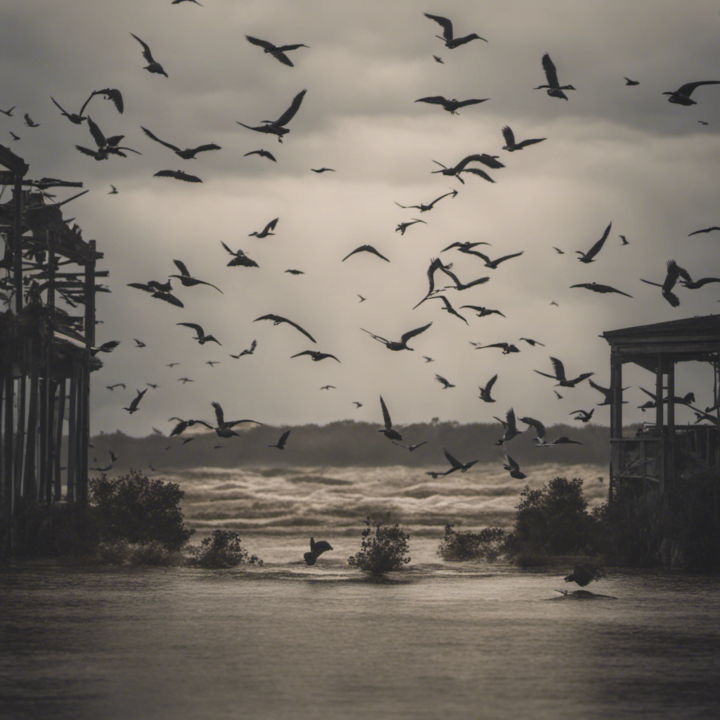
Not only do such studies aid conservation efforts as experts develop effective measures for protecting vulnerable bird populations before and after storms occur, they also serve as valuable indicators of hurricane severity and potential impacts in specific regions.
By monitoring birds’ responses to approaching storms, scientists can gather critical data that aids in forecasting storm intensity more accurately while tracking storm paths.
Observing how birds navigate hurricanes provides us with remarkable insights into their adaptive capabilities.
From altering flight patterns to seeking refuge in unexpected places,
these marvelous creatures exemplify resourcefulness when confronting nature’s fury head-on. As we continue learning from their behaviors, it is crucial to recognize the significance attached further research on bird behavior during hurricanes.
This knowledge contributes not only to our understanding of awe-inspiring natural phenomena and where do birds go during hurricanes but also enhances conservation efforts aimed at preserving avian species affected by these powerful storms.
# Where Do Birds Go During Hurricanes? Hurricanes are powerful and destructive natural phenomena that can have a significant impact on wildlife.
While most of us focus on human safety during these storms, it is also essential to understand how other creatures, such as birds, behave in hurricanes.
By gaining insight into where do birds go during hurricanes and their behavior, we can better appreciate their resilience and adaptability.
In this article, we will delve into various reputable sources to explore the question: where do birds go during hurricanes?
Let’s examine the information gathered from several URLs provided for our research.
What do birds do in hurricanes?
“What do birds do in hurricanes?” – Audubon Society**
The Audubon Society provides valuable insights into bird behavior during hurricanes]. They explain that not all species react to storms in the same way. Some birds possess extraordinary navigational abilities and sense changes in atmospheric pressure well before humans can perceive them.
These avian meteorologists may change their feeding behaviors or take cover when they anticipate a storm’s arrival. For instance, shorebirds often sense an approaching hurricane by detecting low air pressure and increased humidity.
Consequently, they might adjust their flight patterns or even migrate away from coastal areas earlier than usual.
Where Do Birds Go In A Hurricane?” – Forbes**
Forbes contributes to our understanding by pointing out that certain migratory bird populations have developed advanced strategies for dealing with inclement weather conditions like hurricanes.
Fueled by instinct honed through countless generations of evolution, these species undertake long flights across vast distances to escape impending danger.
Interestingly enough, some small passerines known as “vagrant” or “storm-driven” migrants actually take advantage of strong winds associated with tropical cyclones .
Instead of hunkering down or altering their path radically when confronted with a hurricane’s approach, these daring adventurers seize the opportunity to be transported thousands of miles off course. They may end up in remote or unexpected locations, providing ornithologists with valuable opportunities for research and observation.
How Do Birds Survive a Hurricane?
Sarasota Magazine delves into the question of how birds manage to survive amidst hurricane conditions. The key lies in their incredible adaptability. Many species possess remarkable flight capabilities that enable them to navigate high winds and turbulent air currents.
Another crucial factor is their ability to seek shelter. Birds often take refuge in dense vegetation, such as trees or shrubs, which provides protection from wind gusts and flying debris.
Furthermore, some large bird species like herons and egrets can withstand strong winds by perching on sturdy structures like buildings or bridges.
To illustrate this behavior further, let’s explore together.
“What Do Birds Do in a Hurricane?” – Hakai Magazine** Hakai Magazine presents us with an intriguing case study involving brown pelicans in South Carolina during Hurricane Hugo.
These majestic seabirds were subject to extreme weather conditions but managed not only to survive but also find creative ways to cope with the storm’s impact.
During heavy rain showers associated with hurricanes, brown pelicans take advantage of tree canopies in upland areas far from water bodies where they typically reside.
By seeking temporary shelter inland until flooding subsides, these resourceful creatures demonstrate their ability to adapt while ensuring their survival during severe weather events.
## Importance of Further Research Understanding bird behavior during hurricanes is vital for several reasons. First and foremost, it highlights the ingenuity and resilience exhibited by avian species when faced with challenging circumstances.
Studying where do birds go during hurricanes and these strategies helps conservationists develop effective measures for protecting vulnerable bird populations before and after storms occur. Furthermore, bird behavior can serve as an indicator of the severity and potential impacts of hurricanes in specific regions.
By monitoring birds’ responses to approaching storms, scientists can gather valuable data that may aid in forecasting storm intensity and tracking their paths more accurately.
In conclusion, observing how birds navigate hurricanes provides us with valuable insights into their adaptive capabilities.
From altering flight patterns to seeking shelter in unexpected places, these remarkable creatures demonstrate their resourcefulness and ability to face nature’s wrath head-on.
As we continue learning from their behaviors and where do birds go during hurricanes, let us also recognize the importance of further research on bird behavior during hurricanes for both conservation efforts and our understanding of these awe-inspiring phenomena.
**Sources**
1. Audubon Society – What do birds do in hurricanes
2. Forbes – Where Do Birds Go In A Hurricane
3. Sarasota Magazine – How Do Birds Survive a Hurricane
4. Hakai Magazine – What Do Birds Do In A Hurricane

Key Takeaways – Where do birds go during hurricanes
- Birds exhibit different behaviors during hurricanes, with some species having the ability to sense approaching storms and adjust their behavior accordingly.
- Shorebirds often detect changes in air pressure and humidity, prompting them to alter their flight patterns or migrate away from coastal areas earlier than usual.
- Certain migratory bird populations have evolved advanced strategies to escape hurricanes by undertaking long flights across vast distances.
- Some small passerines known as “storm-driven” migrants take advantage of strong winds associated with tropical cyclones, allowing them to be transported off course and providing research opportunities for ornithologists.
- Birds possess remarkable flight capabilities that enable them to navigate high winds and turbulent air currents associated with hurricanes.
- Seeking shelter in dense vegetation such as trees or shrubs is a common survival strategy for birds during hurricanes. Large bird species may also perch on sturdy structures like buildings or bridges.
- Brown pelicans in South Carolina demonstrated adaptive behavior during Hurricane Hugo by seeking temporary shelter inland until flooding subsided. This highlights their resourcefulness in coping with extreme weather events.
- Further research on bird behavior during hurricanes is important for conservation efforts, forecasting storm intensity, and tracking storm paths more accurately.
FAQs: Where Do Birds Go During Hurricanes?
What is the significance of understanding bird behavior in hurricanes?
Understanding bird behavior in hurricanes is important for several reasons. It helps scientists study the impact of extreme weather events on different species, provides insights into their survival strategies, and contributes to conservation efforts.
By knowing where birds go during hurricanes, we can better protect their habitats and ensure their long-term survival.
Do all birds migrate or seek shelter during a hurricane?
Not all birds respond to hurricanes in the same way.
While many migratory bird species navigate around storms by altering their flight paths or delaying migration, some resident bird populations may hunker down and seek shelter in protected areas until the storm passes.
The response varies depending on factors such as species, location, and individual behavior.
Coastal Birds – Where do birds go during hurricanes?
Coastal bird species often have specific strategies to cope with hurricanes. Some larger shorebirds may ride out the storm by finding sturdy perches or seeking cover behind natural barriers like dunes or vegetation while avoiding flying against strong winds. Others might fly inland to find safer roosting sites away from vulnerable coastal areas.
Are there any specific case studies that highlight bird behavior during hurricanes?
One notable case study mentioned is that of Brown pelicans in South Carolina. These pelicans take refuge on uninhabited islands before a hurricane hits rather than migrating elsewhere like some other seabirds do.
Their ability to withstand strong winds and survive drastic changes in water levels demonstrates how certain bird species adapt to these extreme conditions.
In what ways does severe weather affect bird populations within affected areas?
Severe weather events like hurricanes can have both immediate and long-term impacts on bird populations.
The destruction of habitats, such as coastal marshes or nesting grounds, can lead to the displacement or loss of breeding pairs and nests. Extreme winds may also directly injure or kill birds.
Additionally, changes in food availability before and after a hurricane can negatively affect their survival.
Are there any ongoing research efforts focused on understanding bird behavior during hurricanes?
Yes, ongoing research is being conducted on where do birds go during hurricanes to enhance our understanding of how different bird species respond to hurricanes. Scientists are using various tracking methods like GPS tags and radar systems to monitor bird movements before, during, and after storms.
This research on where do birds go during hurricanes aims to provide valuable insights into the specific strategies employed by birds during extreme weather events. Please note that further details about these FAQs can be found within the article “Where Do Birds Go In A Hurricane?”
